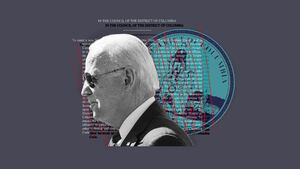Every year, the president unveils a budget proposal for the federal government that represents (at best) a starting point for negotiations with Congress. At worst, it’s a load of hot air and partisan fan service. President Joe Biden just released his latest budget—and it’s mostly the latter.
Still, it sure sounds good on the surface level. The White House says its budget will “help families breathe a little easier” by “investing in America, lowering costs for families, protecting and strengthening Social Security and Medicare, reducing the deficit, and more.” Oh, and it’ll supposedly do it all by only raising taxes on “the rich” and big corporations. What’s not to love?
Well, a lot, actually, once you look beneath the surface.
For example, President Biden is claiming his budget would reduce the federal budget deficit by $3 trillion. While perhaps true, at least under a series of rosy assumptions, that’s quite a spin on what it would actually do.
According to the nonpartisan Committee for a Responsible Federal Budget (CRFB), the national debt would hit a new record by 2027 under Biden’s plan. Total federal debt would increase by an astounding $19 trillion over the next decade. The national debt would reach 110 percent of GDP by 2033, meaning we’d owe significantly more in debt than our economy produces in an entire year.
That means slower economic growth, less private sector investment in the economy, and trillions in taxes just to cover the interest payments.
Biden’s $3 trillion in deficit “savings” is just compared to a hypothetical baseline projection, meaning it’s arguably slightly less fiscally reckless than the status quo. But the president’s budget clearly doesn’t do anywhere near enough to restore fiscal sanity as he has promised—on the contrary, it would take the U.S. to record levels of debt.
Oh, and while Biden is boasting about how unlike those mean Republicans, his plan doesn’t cut Social Security, that also means it does nothing to fix Social Security.
As a result, it effectively, through inaction, endorses the automatic sharp benefit cuts that will occur when Social Security becomes insolvent in 2033. Without actual reforms, benefits will be cut by at least 23 percent at that point, according to the Congressional Budget Office.
And while Biden claims that his budget shores up Medicare, it does so in part with budget gimmicks that don’t actually equate to real savings, according to Manhattan Institute economist Brian Riedl.
Meanwhile, on the tax front, Biden’s proposal is surprisingly aggressive. His plan includes almost $5 trillion in tax hikes, including a big increase in the corporate tax rate, an increase in the top bracket income tax rate, a new “billionaire tax” on unrealized capital gains, a quadrupling of the tax on stock buybacks, and more.
This would all amount to the biggest tax hike since the 1960s and “the highest sustained tax burden in American history,” per Riedl. Doesn’t that sound like just what the economy needs to avoid a recession?
Now, the tax hikes are nominally targeted at the wealthiest Americans and Big Business, and I certainly don’t expect people to break out the tiny violins and feel bad for the Jeff Bezos of the world. But the harsh economic reality is that taxes nominally applied to “the rich” and “Big Business” often have economic ramifications that hurt everyday Americans—and Biden’s tax proposals are no exception.
For example, raising the corporate tax rate sounds like it would only hurt corporate bigwigs. But economists across the ideological spectrum largely agree that a significant portion of the corporate tax is ultimately borne by workers via lower wages. They disagree about the exact percentage, yet about 70 percent is the most likely percentage, according to the nonpartisan Tax Foundation.
So, Biden’s massive tax hike on “corporations” would ultimately hit American workers right in the paycheck. It would also hurt investment and, as a result, could eliminate an estimated 159,000 jobs.
Does that sound like “helping families breathe easier” to you?
What’s more, the proposed increases in business taxes would put the U.S. far out of step with other developed countries. At 32.2 percent, our combined federal and state corporate tax rate would be a full 10 points higher than other OECD countries, according to the Tax Foundation. That puts us at a sharp competitive disadvantage when it comes to attracting jobs and investment.
All in all, Biden’s budget proposal is a mix of rosy rhetoric, optimistic assumptions, lofty goals, and bad ideas. Thankfully, he’ll have to get his actual budget through a Republican-controlled House of Representatives. The final result should bear little resemblance to this partisan first draft. And America will be much better off than if Biden’s first draft of a budget became a reality.







